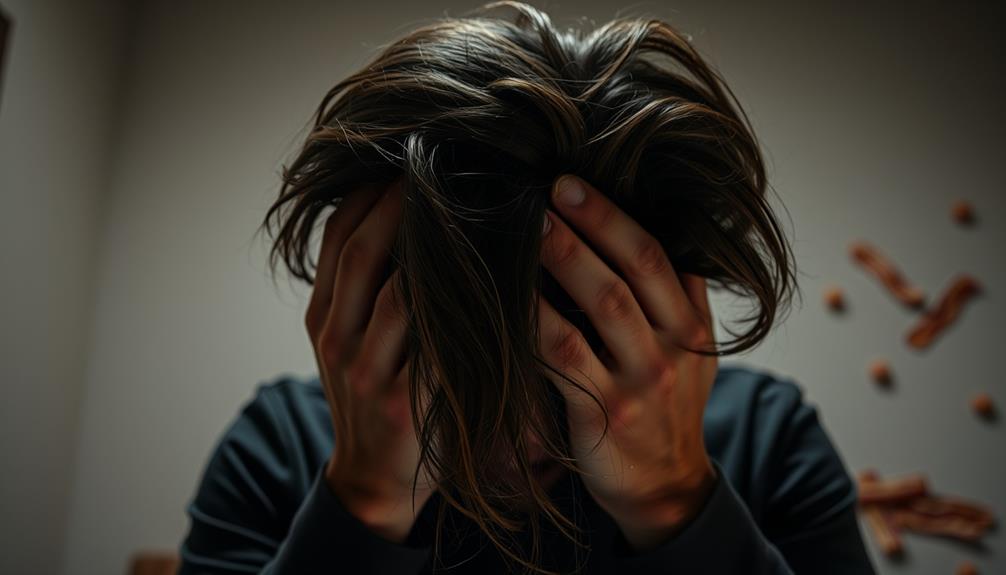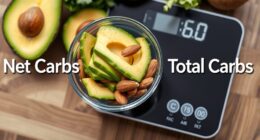Yes, the keto diet can cause hair loss for several reasons. You might experience nutritional deficiencies, especially if you don't get enough essential vitamins and minerals like biotin and iron. Rapid weight loss is another factor, potentially triggering temporary hair shedding known as telogen effluvium. Hormonal fluctuations due to the diet can disrupt your hair growth cycles too. Stress from dietary changes can also contribute to hair thinning. To mitigate these effects, it's essential to monitor your nutrient intake and manage stress effectively. If you're curious about further strategies, there's more helpful information ahead.
Key Takeaways
- The keto diet can lead to hair loss due to nutritional deficiencies, particularly in biotin, vitamin D, and iron.
- Rapid weight loss from keto may trigger telogen effluvium, causing temporary hair shedding 2-5 months after starting the diet.
- Insufficient protein intake on a keto diet can hinder the production of amino acids essential for healthy hair follicles.
- Hormonal fluctuations, including decreased T3 and increased cortisol levels, can disrupt hair growth cycles during ketosis.
- Stress from significant dietary changes, or "keto flu," can exacerbate hair loss and anxiety, affecting overall hair health.
Causes of Hair Loss on Keto

Hair loss can be a surprising consequence of the keto diet, and it's essential to understand the underlying causes. One significant factor is nutritional deficiencies. The restrictive nature of the keto diet often leads to inadequate intake of essential vitamins and minerals like biotin, vitamin D, and iron, all important for healthy hair growth.
Additionally, the lack of diverse food sources can lead to insufficient antioxidants, which are critical for overall health and may impact hair vitality, as noted in the context of juice diets.
Additionally, rapid weight loss frequently associated with the keto diet can trigger a condition called telogen effluvium, which causes temporary hair shedding. This usually occurs 2-5 months after you've made significant dietary changes. If you're not consuming enough protein, that can hinder your body's ability to produce the amino acids necessary for hair follicle health.
Moreover, hormonal fluctuations during this diet, particularly decreased T3 hormone levels and increased cortisol (the stress hormone), may disrupt your hair growth cycle. The shift to ketosis can elevate stress levels, often referred to as "keto flu," further exacerbating hair loss.
Nutritional Factors for Hair Health

Maintaining healthy hair hinges on a balanced intake of essential nutrients, especially when following a ketogenic diet. Nutritional deficiencies can lead to hair loss, making it imperative to guarantee you're getting enough biotin, vitamin D, iron, and omega-3 fatty acids. These nutrients play critical roles in hair follicle health and growth.
For instance, a daily protein intake of at least 0.8 grams per kilogram of body weight is recommended to support robust hair growth. Low protein levels can hinder this process. Additionally, considering a cold medications overview can be beneficial, as some medications may impact nutrient absorption.
Incorporating nutrient-dense foods into your meals is important. Foods rich in iron, like shellfish and leafy greens, help prevent dry and damaged hair; aim for 18 mg daily for women and 8 mg for men. Omega-3 fatty acids found in fatty fish and walnuts support scalp health, which is essential for strong hair.
Don't forget about vitamins A, C, and E; these are important for maintaining hair vitality.
To mitigate the risks of hair loss while on a keto diet, focus on a diverse range of nutrient-dense foods. By prioritizing these essential nutrients, you can help guarantee your hair remains healthy and vibrant.
Stress and Its Effects on Hair

Stress can take a significant toll on your hair health, often leading to increased shedding and thinning. Both emotional and physical stress disrupt normal hair growth cycles, pushing more hair follicles into the resting phase known as telogen.
If you've recently started a ketogenic diet, the substantial dietary changes can be a stressor, potentially amplifying anxiety and hair loss during the adjustment phase. Additionally, individuals with emotional dysregulation, such as those with Borderline Personality Disorder, may experience heightened stress responses that further impact hair health.
Here are some factors to reflect on regarding stress and hair loss:
- Elevated cortisol levels from stress can interfere with hormone balance.
- Emotional stress can trigger telogen effluvium, which often occurs 2-5 months after a significant stressor.
- Dietary changes associated with the keto diet can introduce additional stress.
- Increased anxiety may further exacerbate hair thinning.
- Stress can lead to a disruption in your hair growth cycles, causing more follicles to rest.
Recognizing the connection between stress and hair loss is crucial. By managing stress effectively, you can help mitigate its impact on your hair health.
Incorporating techniques like meditation, adequate sleep, and mindful food choices can support you during this adjustment, promoting healthier hair growth as you adapt to your new diet.
Strategies for Promoting Hair Regrowth

When it comes to promoting hair regrowth, several effective strategies can make a real difference. First, focus on your nutrient intake. Incorporate protein sources like fatty fish, eggs, and nuts, which provide essential amino acids vital for hair follicle health.
Additionally, consider using essential oils for hair growth such as rosemary or peppermint oil, which can enhance circulation to the scalp. Supplementing with biotin (2.5 to 5 mg daily), iron (with vitamin C), and zinc can also help combat nutrient deficiencies often seen in ketogenic diets.
Don't overlook the power of scalp massage. Regularly using caffeine shampoos and scalp massage serums can enhance blood circulation to your hair follicles, creating a better environment for hair growth.
Additionally, monitor your macronutrient intake to guarantee you're getting adequate protein—aim for at least 0.8 grams per kg of body weight. This helps prevent prolonged hair loss while on a keto diet.
Lastly, prioritize stress management. Techniques like mindfulness, meditation, and making sure you get enough sleep can mitigate stress's adverse effects on hair health during dietary changes.
When to Seek Medical Help

Persistent hair loss can be concerning, especially after making dietary adjustments on the ketogenic diet. If you notice that hair loss goes beyond the typical 2-3 months of shedding during the initial adaptation phase, it's time to seek medical help.
It's essential to guarantee that your diet remains balanced and provides vital nutrients for overall health, as effective strategies for weight loss can also support hair health.
Here are some signs that indicate you should consult a healthcare professional:
- You experience excessive hair shedding or noticeable thinning, despite efforts to address nutrient deficiencies.
- Other symptoms accompany your hair loss, such as fatigue, mood swings, or skin issues.
- You have existing chronic conditions like high blood pressure or heart disease and want to assess the safety of the ketogenic diet.
- Hair loss persists after dietary changes, signaling potential hormonal imbalances or other health concerns.
- You feel unsure about whether your current diet is contributing to nutrient deficiencies.
Getting medical advice can help identify the root causes of your hair loss and guide you toward effective solutions.
Blood tests may be necessary to check for any underlying issues that could be leading to persistent hair loss.
Don't hesitate to reach out if you have concerns; your health matters.
Frequently Asked Questions
How to Stop Hair Loss While on a Keto Diet?
To stop hair loss on a keto diet, guarantee you're getting enough protein and essential nutrients. Incorporate foods high in vitamins and minerals, manage stress effectively, and consider supplements to support your hair health.
Does Not Eating Carbs Cause Hair Loss?
Imagine a garden thriving with diverse plants. If you stop watering one section, it withers. Similarly, not eating carbs can create nutrient gaps, potentially leading to hair loss as your body struggles to thrive.
Is Keto Good for Hair and Skin?
Keto can be good for your hair and skin if you guarantee adequate nutrient intake. By focusing on nutrient-dense foods and supplements, you'll support hair growth and maintain skin health while enjoying the diet's benefits.
Will Hair Loss Due to Diet Grow Back?
Yes, hair loss from dietary changes often grows back. As your body adjusts, ensuring you get enough nutrients helps speed up recovery. Keep monitoring your intake, and you'll likely see regrowth soon after.
Conclusion
To sum up, while the keto diet can lead to hair loss for some, understanding the underlying causes helps you take charge of your hair health. By focusing on proper nutrition, managing stress, and implementing effective regrowth strategies, you can nurture your hair back to life. Remember, every strand lost is a reminder of the journey you're on—embrace it, and soon you'll see that vibrant hair is just a few thoughtful choices away.









